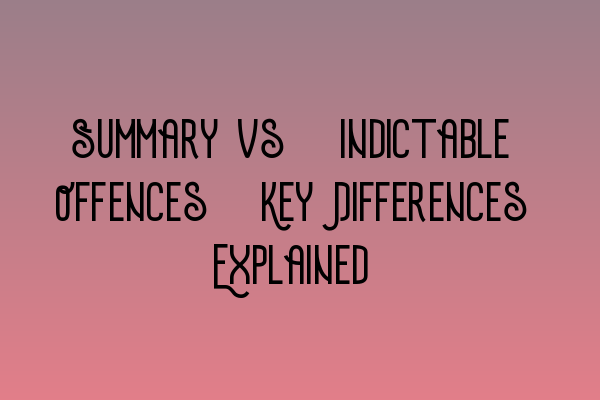Summary vs. Indictable Offences: Key Differences Explained
Welcome to the blog of SQE Criminal Law & Practice Law UK! Today, we will be diving into the key differences between summary and indictable offences. Understanding these differences is crucial for anyone practicing criminal law in the United Kingdom. Let’s get started!
Summary Offences
A summary offence, also known as a misdemeanor, is a less serious criminal offence that can be tried by a magistrate in a magistrates’ court without a jury. These offences include a wide range of non-indictable offences such as petty theft, public disorder, and minor traffic violations.
Summary offences are typically heard and decided promptly, allowing for a speedier resolution compared to indictable matters. This process is suitable for straightforward cases with clear evidence and lesser penalties.
Examples of summary offences include:
- Possession of a controlled substance for personal use
- Shoplifting goods of low value
- Driving without insurance
If you are planning to practice criminal law and need to familiarize yourself with summary offences, we recommend checking out our SQE 1 Practice Exam Questions for comprehensive preparation.
Indictable Offences
In contrast to summary offences, indictable offences are more serious criminal offences that are typically tried in the Crown Court before a judge and jury. These offences include crimes such as murder, rape, and robbery.
The process for indictable offences is more complex and can involve multiple stages, including a preliminary hearing, trial, and sentencing. Due to the gravity of these offences, the penalties can be severe, including lengthy prison sentences.
If you are aspiring to become a criminal lawyer and want to specialize in handling indictable offences, we recommend exploring our SQE 2 Preparation Courses to enhance your knowledge and skills.
Examples of indictable offences include:
- Murder
- Robbery with a weapon
- Rape
For those who are interested in the general preparation for criminal law practice, our SQE 1 Preparation Courses offer a comprehensive curriculum to help you succeed in the field.
The Key Differences
Now that we have covered the basics of summary and indictable offences, let’s take a closer look at the key differences:
- Trial Procedure: Summary offences are tried in a magistrates’ court without a jury, while indictable offences are tried in the Crown Court with a jury.
- Punishment: Summary offences carry relatively lighter penalties, including fines and community service, whereas indictable offences can result in imprisonment, depending on the severity of the crime.
- Speed of Resolution: Summary offences are typically resolved more quickly compared to indictable offences, which involve more complex legal procedures and a longer trial process.
For a detailed overview of the different stages involved in criminal proceedings, including the trial process and sentencing, we recommend reading our article on SRA SQE Exam Dates.
Remember, as a criminal law practitioner, it is crucial to understand the nuances between summary and indictable offences to effectively represent your clients and navigate the legal system.
Conclusion
In summary (no pun intended), summary and indictable offences are distinct in their severity, trial procedures, and potential penalties. Whether you are preparing for the SQE exams or embarking on a career in criminal law, it is essential to grasp these key differences to provide the best legal representation.
If you want to test your knowledge of criminal law and familiarize yourself with various legal scenarios, we encourage you to take a look at our SQE 1 Practice Mocks FLK1 FLK2.
